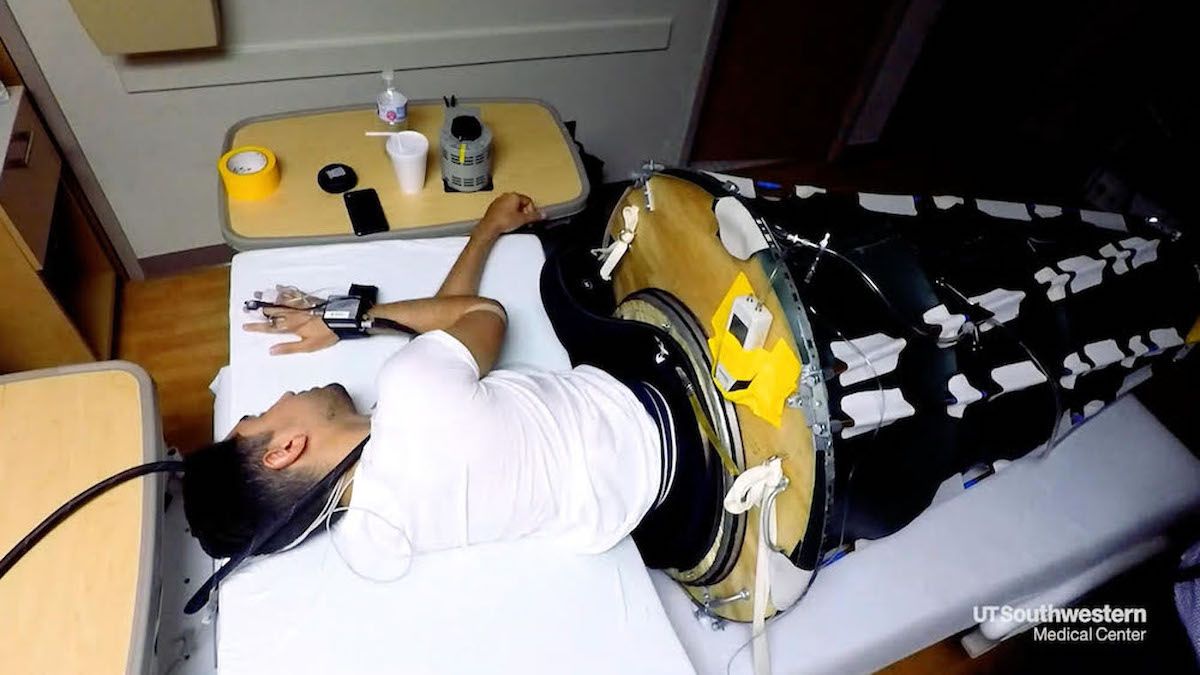Create a free profile to get unlimited access to exclusive videos, sweepstakes, and more!
Could a futuristic sleeping bag solve how humans see in space?
Fluids flow toward the brain without gravity to hold them down, but a next-gen sleeping bag could help.

Sleeping might be the last thing you associate with vision, but that could soon change in space.
Turns out Ridley Scott was right by putting the crew of the Nostromo in cryo-pods where they stayed in suspended animation until landing. Microgravity is brutal on the human body and pressures the brain. While there is no evidence of anything to ease the effects of microgravity in Alien, there might as well be, especially since a new next-gen sleeping bag has now been developed to take pressure off the brain while astronauts drift off — both literally and otherwise.
Lying in bed and floating in space have similar effects. The thing is that those effects are immediately reversed once you sit or stand up, but astronauts get no such relief. Fluids flow upwards toward the brain without gravity to hold them down, but now there could be a solution. Cardiologist Benjamin Levine, M.D., of UT Southwestern has been working with NASA to develop a weighted sleeping bag that could relieve abnormal blood flow and brain pressure. He recently published a study on his new sleeping bag prototype in JAMA Ophthalmology.
“One of our biggest challenges was to make the sleeping bag comfortable to sleep in and stable enough to hold pressure without collapsing,” he told SYFY WIRE. “Another was coming up with a way to allow the subjects to turn over in bed — this is not a problem in space, of course.”
Microgravity can do some grotesque things. Besides allowing half a gallon of bodily fluids to ooze into places they don’t belong, it also warps the shape of our eyeballs, which explains why so many astronauts have complained of vision problems. That will happen when your eyeballs get flattened from the excess pressure. Spending several months to a year in zero-G could even do serious damage in the form of spaceflight-associated neuro-ocular syndrome (SANS).
The sleeping bag has a removable solid frame that helps with readjusting fluids in the body and taking pressure off the brain. Similar to the gravity suits meant to get astronauts’ bodies functioning as if they were back on Earth, at least temporarily, this tech uses negative pressure to reverse things. Negative pressure tech has been used in space for a while to prevent or at least delay muscle and bone atrophy. This is the first time it is being incorporated into something designed to stabilize fluids for many hours and possibly prevent SANS.
“The back of the eye is directly connected to the fluid surrounding the brain, so if intracranial pressure goes up more than intraocular pressure, the eye will flatten,” said Levine. “By sucking fluid out of the brain and into the lower part of the body, this lowers the intracranial pressure.”
It could have easily been a prop in any of the Alien movies, as this sleeping bag may look like it comes from the future, but it has real benefits that astronauts may need in several years when crewed missions to the Moon start again. Many test subjects in Levine’s previous study on SANS were cancer survivors. Because they still had ports on their heads, necessary for receiving chemotherapy, it was a rare chance to measure pressure on the brain. Volunteer James Leidner, M.D., himself a doctor, tested out the sleeping bag proto after lying down for 72 hours straight.
This might also be the answer to why astronauts get a case of what they call the “space stupids”, which is when they feel disoriented and realize they are making more mistakes than they should, but cannot figure out the reason. Feelings of being upside down have been reported even when the astronaut was positioned upright. Weightlessness can confuse the brain when it comes to orientation, which may explain that. Some astronauts only suffer from these symptoms for a few days. Others have to deal with them until they finally touch down on Earth.
“I think that there are multiple factors that contribute to the ‘space stupids,’ including a very novel environment, space motion sickness, and perhaps the inability to lower pressure in the brain by standing up,” Levine said.
If humans are ever going to head to Mars, keeping astronaut brains and eyeballs from getting distorted is as important as protecting the rest of their outsides and insides from killer cosmic radiation. The answer just might be sleeping in an ultracool space pod.


























